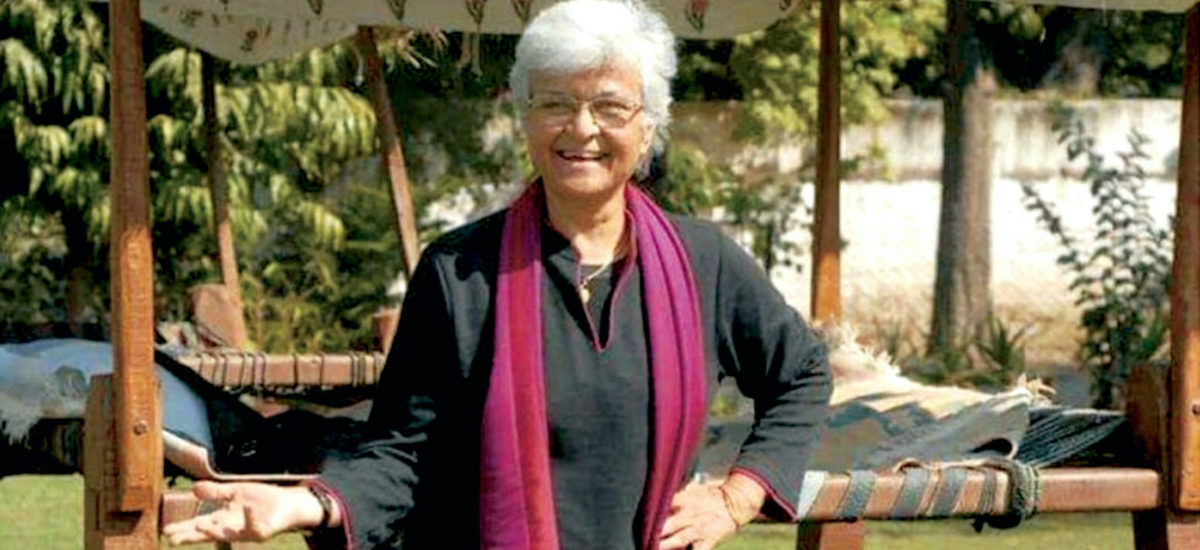Photo courtesy of The Focus India
We mourn the loss of Kamla Bhasin, feminist activist, writer, poet, mentor and friend who left us on September 25. Kamla has been a core part of influencing and collaborating with feminist movements in Sri Lanka since the 1980s.
SANGAT, the South Asian feminist network, was imagined and given life at a workshop of gender trainers held in Bangladesh and organized by the FAO-NGO Programme in 1998. Since then, SANGAT has been working within Jagori, a feminist organization in New Delhi. Through SANGAT, Kamla taught and mentored hundreds of women over decades in their personal feminist journeys and as activists in movements across the region. For many people who became a part of the SANGAT network, through its courses that lasted from a few weeks to a month, she was instrumental in demystifying the basics of feminist thought and ideas. She made feminism accessible and demanded that we challenge ourselves and the powerful institutions that uphold patriarchal norms. The SANGAT month-long course expanded to include feminist courses run in languages such as Urdu and Tamil. The Tamil language course conducted over the years with EKTA India, Affected Women’s Forum Akkaraipattu, Suriya Women’s Development Centre Batticaloa and Women’s Education and Research Centre Colombo has built a shared feminist network among Tamil speaking activists within Sri Lanka and with those in India for over a decade. She was the South Asia Coordinator for One Billion Rising.
Her deep and unshakeable belief in a South Asian solidarity led to the birth of lifelong friendships and collaborations across borders including with Sri Lankan feminist activists, artists, academics, writers and students. She was deeply committed to peace in South Asia and in Sri Lanka and was convenor of the Forum 1000 Peace Women. She was with the Women’s Initiative for Peace in South Asia (WIPSA), Pak-India Peoples Forum for Peace and Democracy (PIPFPD) and South Asians for Human Rights (SAHR).
Kamla was a prolific writer. She had the special knack of converting complex thought and theorizing into accessible language and formats. She would compose lyrics which she set to the tune of popular music from the region. She would create memorable, powerful slogans which she then made illustrations of in posters, shouted out at protests and demonstrations and even in teaching spaces to motivate her students. Many of us continue to use these slogans, posters and her books. Among her writings are over 30 books on feminism and women’s rights, including a much-loved book on feminist humour and hundreds of feminist songs that energized women’s movements and resistance across the region. Some of her books on the basics of patriarchy and gender are translated into Sinhala and Tamil so they could reach a wider Sri Lankan audience.
She was a warm presence on her trips to Sri Lanka. She was energetic, ready to burst into revolutionary song or dance and deeply connected to the lives of people whose lives she touched here. She joined us in many demonstrations on her visits. On March 21, 2006, along with many workers and activists, she marched through the Katunayake Free Trade Zone area on a torchlight parade, our first ‘Take Back the Night’ agitation organized by the Mothers and Daughters of Lanka against street harassment of factory workers. In 2008 she came with a team of Indian activists and led the colourful and vocal people’s SAARC demonstrations through the streets of Colombo. The protest was planned and organized by the Women and Media Collective to coincide with the SAARC summit to enhance people’s voices demanding food security and calling on the SAARC countries to be accountable to the people of South Asia.
The last time many of us in Sri Lanka ‘saw’ her was at the memorial for Sunila Abeysekera over zoom on September 4, 2021 organised by the Women and Media Collective. She was weaker and disoriented. Nevertheless, she strongly declared, “Sunila is my best friend!”. Then she asked insistently, in that typical Kamla way, “Did you sing Bread and Roses yet?” and when we said no, she declared that this was not an apt memorial for her best friend. Upon her loving insistence, we quickly lined up the video of Sunila singing Bread and Roses. That is how Kamla declared her love for her best friend – a special moment that we got to witness.
Kamla has mentored generations of feminists in Sri Lanka. She is one among the few across the ocean that maintained a sustained involvement here and with many sections of the Sri Lankan women’s movements across region, language, ethnicity, class, and generations. To us, such teaching and consistent work over decades, beyond the hegemonic boundaries of the nation states, is an inspiration.
In her last visit to Sri Lanka in 2019 she energized and gave her full support for the launching of a Sinhala language SANGAT course, which is to be coordinated by the Women’s Education and Research Centre. The Tamil and Sinhala language SANGAT feminist trainings and the One Billion Rising campaigns will continue her wonderful legacy and keep alive her dreams for a free, equal and just South Asia for all. She will live on in her songs that we will sing for as long as we can, translated into our languages, and with the passion and love that Kamla has left behind in all of us. Thank you Kamla. Rest in peace.


